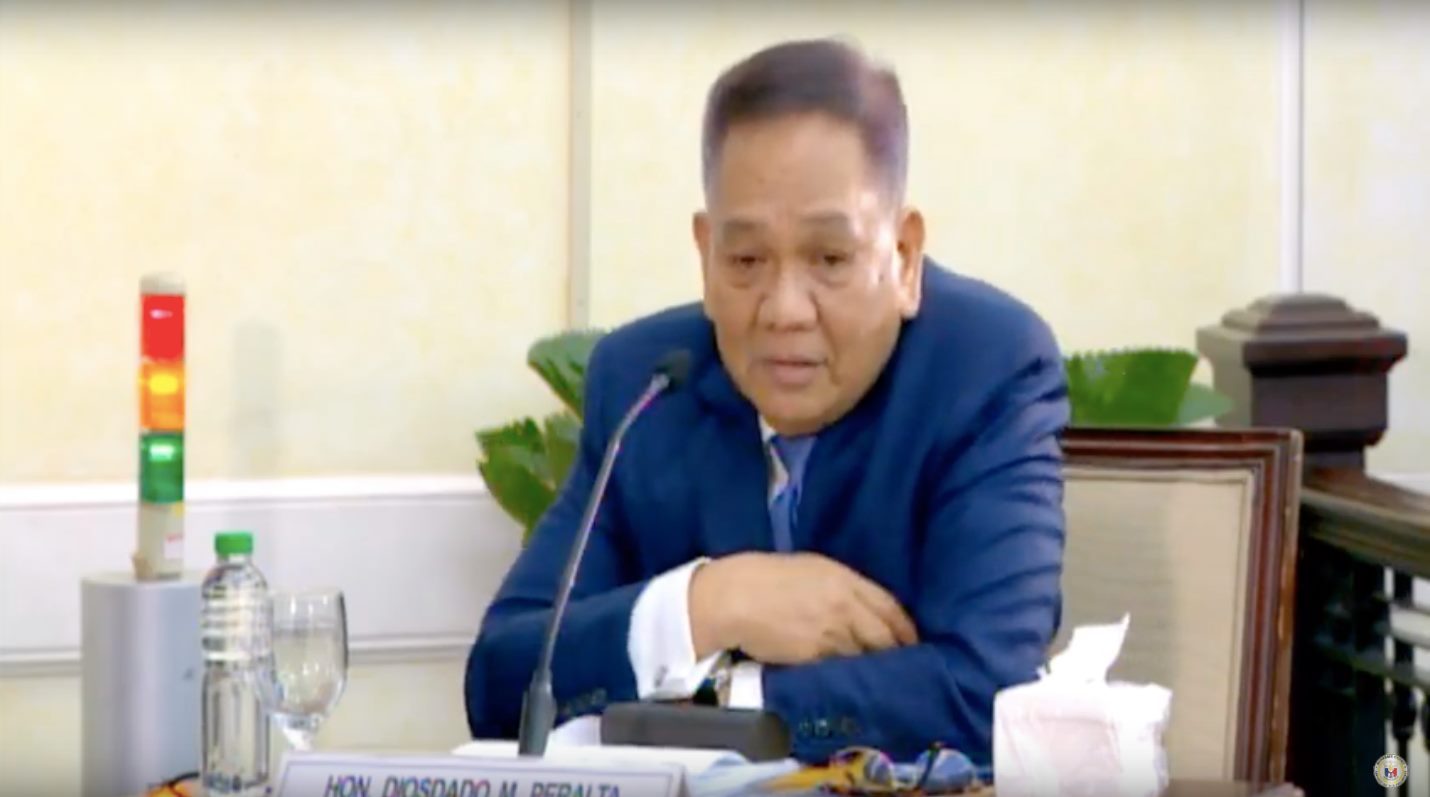SUMMARY
This is AI generated summarization, which may have errors. For context, always refer to the full article.

MANILA, Philippines – “I deserve to be chief justice.”
A teary-eyed Supreme Court (SC) Associate Justice Diosdado Peralta made the declaration as the Judicial and Bar Council (JBC) wrapped up his interview for the chief justice position on Wednesday, October 2.
“I’m not competing with the other applicants, they may also be qualified…. It’s up to you to judge us but what I can only say, sometimes sentimental ako eh (I’m sentimental). If I remember what I have experienced since I started working, mahirap eh (it’s hard), I think I deserve to be chief justice because I worked very hard all these years,” Peralta said in tears. (READ: How they voted: Meet the chief justice aspirants for 2019)
In an interview that lasted for an hour and a half, JBC members mostly asked Peralta about his plans to address problems of the judiciary such as clogged dockets, and the killing of lawyers, prosecutors, and judges.
Two JBC members – retired justice Noel Tijam and retired judge Toribio Ilao – got a little bit personal when they asked him if he was an “arrogant and difficult” justice.
“You will be the first to tell everybody if I’m arrogant or not. Probably they misinterpret arrogance for [my being] passionate. I admit I’m passionate in all deliberations…. It would be [like] lifting myself if I say probably I’m the most approachable justice in the Supreme Court. That’s really what I am,” Peralta told Tijam.
Defending his ponencias
At one point, Peralta was grilled on his ponencias related to drug cases.
For example, Peralta wrote the decision that allowed plea bargaining in small time drug cases.
“There is a perception from some sectors that it sort of put a damper on the campaign on drug cases because it stymied the effectivity of the drug operation,” Tijam said of the ruling.
Peralta defended his decision by saying that most of the nearly 100,000 drug cases a year involve small amounts of illegal drugs.
Retired justice Jose Mendoza, JBC executive committee chairman, also asked Peralta to defend his ponente in People vs Romy Lim, a decision that set a precedent on dismissing weak drug cases.
The “weak” cases usually involve cops committing lapses in handling seized drugs as evidence. The SC decision has led to acquittals of drug suspects both in the lower courts and in the High Court.
Peralta said some judges had misinterpreted his ponencia. He said his decision should not be used to blanketly acquit drug suspects but just to dismiss cases without prejudice to a refiling where cops would have the chance to justify their non-compliance to the rules.
“Sometimes we have to develop the skills of judges so that hindi namimisinterpret (we’re not misinterpreted),” Peralta said.
‘I’m not a topnotcher’
Mendoza, the usual tough interviewer, said toward the end of the interview that he would withhold further questions and gave Peralta the chance to say his last words to the JBC.
That’s when the senior justice teared up.
“I’m not a topnotcher, I’m not an honor student, because that’s what they say – hindi naman daw ako topnotcher, hindi naman ako honor...but I think I was able to compensate with the work that I had done as a public prosecutor, as a judge, as an associate justice of the Sandiganbayan, as a presiding justice, Associate Justice of the Supreme Court, as a lecturer, and the chairman of several committees and member of several committees. I think they are more than enough to compensate with what they say that I do not deserve [to be chief justice],” said Peralta.
“I hope you have to take those into consideration that there is hope for an individual like me. Sorry, medyo (a bit) emotional; that’s me, Your Honor, hindi ako (I’m not) arrogant. That’s me,” he added.
This is the 3rd time that Peralta, who is set to retire in March 2022, is applying to be chief justice.
He was bypassed for the chief justice positions which were instead given to retired chief justice Teresita Leonardo-de Castro and retiring chief justice Lucas Bersamin, his close friend.
Peralta penned the controversial ponencia that allowed the hero’s burial for the late dictator Ferdinand Marcos. Like the Marcoses, Peralta is from Ilocos Norte.
Voting history
Peralta has never voted against President Rodrigo Duterte in cases that directly impacted his administration – like the martial law in Mindanao cases – and even those that were of interest to him, like the quo warranto ouster of Maria Lourdes Sereno.
Key SC decisions from 2006 indicate that Peralta leans towards the executive or politicians.
In cases involving powerful interests, Peralta concurred in the flip-flopping decision of the Court to favor Philippine Airlines (PAL) in a labor case filed by retrenched employees.
In that decision, Peralta, along with Bersamin, also flip-flopped in their individual votes to hand PAL a win.
Peralta also concurred in denying the petitions that sought to demand payment from the United States for the damages inflicted by the USS Guardian on Tubbataha Reef.
Peralta inhibited himself in the highly political cases of Danding Cojuangco’s shares from coco levy, and the grant of bail to Globe Asiatique owner Delfin Lee. – Rappler.com
Add a comment
How does this make you feel?
There are no comments yet. Add your comment to start the conversation.